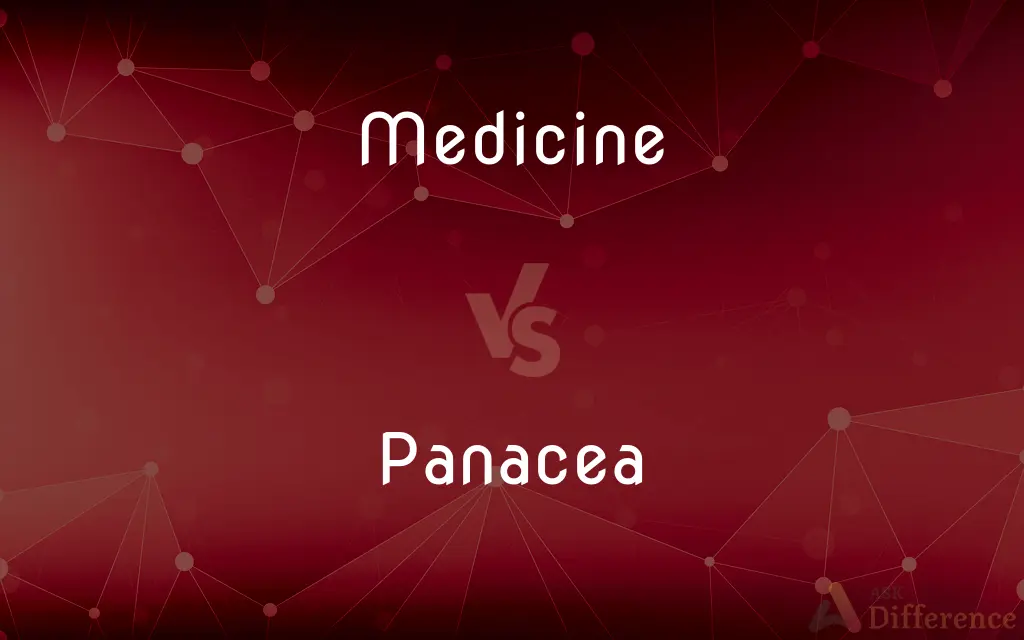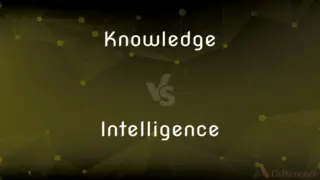Medicine vs. Panacea — What's the Difference?
Edited by Tayyaba Rehman — By Urooj Arif — Updated on April 8, 2024
Medicine refers to drugs or treatments for specific illnesses, while a panacea is a hypothetical cure-all for all diseases and problems.

Difference Between Medicine and Panacea
Table of Contents
ADVERTISEMENT
Key Differences
Medicine is a broad term encompassing drugs, treatments, and interventions designed to diagnose, treat, cure, or prevent disease. Panacea, on the other hand, is a concept from mythology and folklore, representing a universal remedy capable of curing all diseases and ailments.
While medicines are developed through scientific research and are targeted at specific conditions or symptoms, a panacea is an idealistic solution, often used metaphorically to describe a single solution to a multitude of problems.
Medicines are subjected to rigorous testing, clinical trials, and regulatory approval processes before they can be used. In contrast, the idea of a panacea remains in the realm of fiction and wishful thinking, with no real-world equivalent that can address every health issue.
The effectiveness of medicine is evaluated based on evidence, efficacy, and safety for particular conditions or diseases. Meanwhile, the concept of a panacea overlooks the complexity and diversity of medical conditions, suggesting an oversimplified approach to health.
In the medical community, the pursuit of medicines is driven by the need to address specific health challenges through targeted interventions. The notion of a panacea, while appealing, is recognized as unrealistic, emphasizing the importance of specialized and individualized medical treatments.
ADVERTISEMENT
Comparison Chart
Definition
Drugs or treatments for specific illnesses or conditions.
A hypothetical cure-all for all diseases and problems.
Basis
Scientific research and clinical evidence.
Mythology, folklore, and idealistic thinking.
Application
Targeted at specific conditions or symptoms.
Intended to cure all diseases universally.
Regulatory Approval
Subject to testing, clinical trials, and approval.
Not applicable, as it does not exist in reality.
Effectiveness
Evaluated based on evidence for specific conditions.
Conceptually limitless, but practically nonexistent.
Compare with Definitions
Medicine
An over-the-counter pain reliever.
She took the medicine to alleviate her headache.
Panacea
A universal solution in theoretical discussions.
In theory, a panacea for climate change would solve all related issues simultaneously.
Medicine
An antihypertensive medication for controlling high blood pressure.
Regular intake of the medicine helped manage his high blood pressure.
Panacea
An unrealistic expectation of a single cure for multiple illnesses.
Despite hopeful wishes, there is no panacea for all forms of cancer.
Medicine
A chemotherapy drug for cancer treatment.
The new medicine showed promising results in reducing tumor size.
Panacea
A proposed solution to all of society's problems.
The new policy was touted as a panacea for economic instability.
Medicine
A prescribed antibiotic for a bacterial infection.
The doctor prescribed the medicine to combat the patient's bacterial infection effectively.
Panacea
A mythical potion believed to cure all diseases.
The ancient text described a panacea that could heal any ailment.
Medicine
A vaccine to prevent infectious diseases.
The flu vaccine is an essential medicine for preventing seasonal influenza.
Panacea
An all-encompassing remedy in folklore.
Folk tales often speak of a panacea, a magical elixir with healing properties.
Medicine
Medicine is the science and practice of caring for a patient, managing the diagnosis, prognosis, prevention, treatment, palliation of their injury or disease, and promoting their health. Medicine encompasses a variety of health care practices evolved to maintain and restore health by the prevention and treatment of illness.
Panacea
In Greek mythology, Panacea (Greek Πανάκεια, Panakeia) was a goddess of universal remedy and the daughter of Asclepius and Epione. Panacea and her four sisters each performed a facet of Apollo's art: Panacea (the goddess of universal health) Hygieia ("Hygiene", the goddess/personification of health, cleanliness, and sanitation) Iaso (the goddess of recuperation from illness) Aceso (the goddess of the healing process) Aglæa/Ægle (the goddess of beauty, splendor, glory, magnificence, and adornment)Panacea also had four brothers—Podaleirus, one of the two kings of Tricca, who was skilled in diagnostics, and Machaon, the other king of Tricca, who was a master surgeon (these two took part in the Trojan War until Machaon was killed by Penthesilea, queen of the Amazons); Telesphoros, who devoted his life to serving Asclepius; and Aratus, her half-brother, who was a Greek hero and the patron/liberator of Sicyon.
Medicine
The science or practice of the diagnosis, treatment, and prevention of disease (in technical use often taken to exclude surgery)
He made distinguished contributions to pathology and medicine
The remarkable achievements of modern medicine
Panacea
A remedy for all diseases, evils, or difficulties; a cure-all.
Medicine
A drug or other preparation for the treatment or prevention of disease
Your doctor will be able to prescribe medicines
Give her some medicine
Panacea
A remedy believed to cure all disease and prolong life that was originally sought by alchemists; a cure-all.
Medicine
(especially among some North American Indian peoples) a spell, charm, or fetish believed to have healing, protective, or other power
Fleur was murdering him by use of bad medicine
Panacea
A solution to all problems.
A monorail will be a panacea for our traffic woes.
Medicine
The science and art of diagnosing and treating disease or injury and maintaining health.
Panacea
(obsolete) The plant allheal (Valeriana officinalis), believed to cure all ills.
Medicine
The branch of this science encompassing treatment by drugs, diet, exercise, and other nonsurgical means.
Panacea
A remedy for all diseases; a universal medicine; a cure-all; catholicon; hence, a relief or solace for affliction.
Medicine
The practice of medicine.
Panacea
The herb allheal.
Medicine
A substance, especially a drug, used to treat the signs and symptoms of a disease, condition, or injury.
Panacea
Hypothetical remedy for all ills or diseases; once sought by the alchemists
Medicine
Something that serves as a remedy or corrective
Medicine for rebuilding the economy.
Measures that were harsh medicine.
Medicine
Shamanistic practices or beliefs, especially among Native Americans.
Medicine
Something, such as a ritual practice or sacred object, believed to control natural or supernatural powers or serve as a preventive or remedy.
Medicine
A substance which specifically promotes healing when ingested or consumed in some way; a pharmaceutical drug.
This medicine has fewer adverse effects than others in its drug class.
Using a weekly pill organizer is a good way to help remind yourself to take your medicine each day, and it also tells you whether you already took today's pills (it's not unusual to forget doing a habitual task)!
Medicine
Any treatment or cure.
A legislative remedy might be some harsh medicine; is that cure worse than the ill?
Medicine
(uncountable) The study of the cause, diagnosis, prognosis and treatment of disease or illness.
She's studying medicine at university because she wants to be a doctor in the future.
Medicine
(uncountable) The profession and practice of physicians, including surgeons.
The history of medicine can be discretized into eras with differing relationships between physicians and surgeons
Medicine
The profession and practice of nonsurgical physicians as sometimes distinguished from that of surgeons.
The evolving relationship of medicine to surgery in the nineteenth century
Medicine
(uncountable) Ritual magic used, as by a medicine man, to promote a desired outcome in healing, hunting, or warfare; traditional medicine.
Medicine
Among the Native Americans, any object supposed to give control over natural or magical forces, to act as a protective charm, or to cause healing.
Medicine
(obsolete) Black magic, superstition.
Medicine
(obsolete) A philter or love potion.
Medicine
(obsolete) A physician.
Medicine
(slang) Recreational drugs, especially alcoholic drinks.
Medicine
To treat with medicine.
Medicine
The science which relates to the prevention, cure, or alleviation of disease.
Medicine
Any substance administered in the treatment of disease; a remedial agent; a medication; a medicament; a remedy; physic.
By medicine, life may be prolonged.
Medicine
A philter or love potion.
Medicine
A physician.
Medicine
Among the North American Indians, any object supposed to give control over natural or magical forces, to act as a protective charm, or to cause healing; also, magical power itself; the potency which a charm, token, or rite is supposed to exert.
The North American Indian boy usually took as his medicine the first animal of which he dreamed during the long and solitary fast that he observed at puberty.
Medicine
Hence, a similar object or agency among other savages.
Medicine
Short for Medicine man.
Medicine
Intoxicating liquor; drink.
Medicine
To give medicine to; to affect as a medicine does; to remedy; to cure.
Medicine
The branches of medical science that deal with nonsurgical techniques
Medicine
(medicine) something that treats or prevents or alleviates the symptoms of disease
Medicine
The learned profession that is mastered by graduate training in a medical school and that is devoted to preventing or alleviating or curing diseases and injuries;
He studied medicine at Harvard
Medicine
Punishment for one's actions;
You have to face the music
Take your medicine
Medicine
Treat medicinally, treat with medicine
Common Curiosities
What is a panacea?
A panacea is a hypothetical or mythical remedy that cures all diseases and solves all problems.
Are there any real panaceas?
No, due to the complexity and diversity of medical conditions, no universal cure-all exists.
Can medicine act as a panacea?
No, because medicines are specific to conditions, and no single medicine can cure all ailments.
What is medicine?
Medicine refers to substances or treatments used to diagnose, treat, or prevent disease.
Is the search for a panacea considered a scientific pursuit?
The search for universal cures is more mythical than scientific; modern medicine focuses on specific treatments.
Can the idea of a panacea be harmful?
It can lead to unrealistic expectations and reliance on unproven treatments.
Why is the concept of a panacea popular in mythology?
It represents the human desire for simple solutions to complex problems.
How is the effectiveness of medicine measured?
Through empirical evidence, including clinical outcomes and safety profiles.
What role do medicines play in healthcare?
Medicines are essential for treating and managing diseases, improving quality of life.
Is there a modern equivalent to the concept of a panacea?
No, modern medicine acknowledges the complexity of diseases and the need for specialized treatments.
Why is regulatory approval important for medicine?
To ensure that medicines are safe and effective for public use.
How do medicines gain approval?
Through clinical trials, safety evaluations, and regulatory processes to ensure efficacy and safety.
How does the concept of a panacea influence medical research?
It inspires the quest for broad-spectrum treatments but is acknowledged as an unrealistic goal.
Can lifestyle changes be considered a panacea?
While healthy lifestyles can prevent many diseases, they cannot cure all conditions and thus are not panaceas.
What distinguishes a medicine from a panacea in practical terms?
Medicines are real and evidence-based, whereas a panacea is a theoretical concept without basis in reality.
Share Your Discovery

Previous Comparison
Knowledge vs. Intelligence
Next Comparison
Feasibility vs. ViabilityAuthor Spotlight
Written by
Urooj ArifUrooj is a skilled content writer at Ask Difference, known for her exceptional ability to simplify complex topics into engaging and informative content. With a passion for research and a flair for clear, concise writing, she consistently delivers articles that resonate with our diverse audience.
Edited by
Tayyaba RehmanTayyaba Rehman is a distinguished writer, currently serving as a primary contributor to askdifference.com. As a researcher in semantics and etymology, Tayyaba's passion for the complexity of languages and their distinctions has found a perfect home on the platform. Tayyaba delves into the intricacies of language, distinguishing between commonly confused words and phrases, thereby providing clarity for readers worldwide.
















































